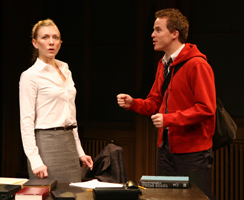
Paulanne Simmons
"Post Mortem" Dies in Second Act
 |
| Tina Benko & Christopher Kromer. Photo by Joan Marcus |
"Post Mortem"
Directed by Jim Simpson
The Flea Theater
41 White St., between Broadway and 7th
Opened Oct. 18, 2006
Wed. Thru Sat. 7 p.m., Sat. matinee 3 p.m.
$35-$45 (212) 352-3101 or www.theatermania.com
Closes Dec. 16, 2006
Reviewed by Paulanne Simmons Nov. 17, 2006
There's nothing wrong with a playwright tackling political themes. And there's no crime in using theater to teach a lesson. But when a play becomes a lecture, there's a big problem.
A. R. Gurney began "Post Mortem," the fourth world premiere of a Gurney play at The Flea, with the premise that neither the political right nor left has the answer to the problems that plague America today. He crafted a satire with a before and after, two sides of a coin, both counterfeit. Then he forgot he was writing a satire and became sincere.
Dexter (Christopher Kromer) a student at a faith-based Midwestern state university of the future, gets a hold of a copy of a play written by "a lesser figure in American drama," named A. R. (Pete) Gurney. This play, one of his later works, is not a "middle-class comedy of manners" typical of his output but a politically charged polemic deemed so dangerous that it's entirely possible Vice President Dick Cheney had the playwright assassinated.
Dexter brings the play to Alice (Tina Benko), his former drama teacher, a sexy lady he's fallen in love with. Despite the university's attempts at stonewalling, Dexter and Alice get the play produced at the school; and despite Alice's reservations, Dexter manages to get Alice into his bed. By Act II, the play Dexter found has become a huge success, actually making a major change on the American political landscape, and Dexter and Alice are married and the parents of five children.
Benko and Kromer are adequate though not particularly brilliant in their roles. Under Jim Simpson's direction, they don't (and perhaps shouldn't) look for any depth to their characters and go for the quick laughs of broad comedy.
Although its too-cute self-referential jokes sometimes get in the way, the play often hits the mark. Oddly, this happens most frequently when the jokes in this political play are about the theater (Alice recalls a time when critics rather than censors decided what the public would see and the critic from one particular newspaper pretty much determined the fate of a play; she talks about plays that were deemed good enough for a British director). And Shannon Burkett's monologue as the overly earnest student interviewer who harangues the audience about the abuse of cell phones in Act II is a tour-de-force.
But when the play becomes a plea for a new third way, even Burkett, with her considerable talents cannot save it. One can feel the audience trying to remain receptive, but eventually getting restless. Finally, the play flounders and falls with the heavy thud of a message too heavy for the messengers.
Back in the 1930s the Surrealists split over the question of whether art and politics were compatible. The Marxists went one way and the apolitical artists went another. Plays like "Post Mortem" make one want to side with the apolitical artists.
| lobby | search
| home | cue-to-cue |
discounts | welcome | film
| dance | reviews |
| museums | NYTW
mail | recordings | coupons |
publications | classified |
